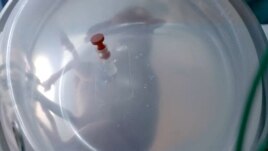09 July 2023
Researchers in the city of Spanish city of Barcelona are trying to "trick nature" by engineering a uterus from special materials.
The goal is to use the artificial uterus to protect babies who are born too early and who have not developed enough to survive outside the womb.
The scientists have tested the artificial uterus with animal fetuses. They were able to keep one fetus alive for 12 days.

A premature lamb fetus is seen inside an artificial womb developed by researchers from BCNatal in Barcelona, Spain, in this screen grab from a video released on June 19, 2023 and obtained by Reuters on June 29, 2023. (La Caixa Foundation/Handout via REUTERS)
The researchers also created an artificial placenta. The placenta is an organ that develops during pregnancy to provide nutrients to the growing baby in the uterus.
The artificial uterus recreates a protected environment in which the fetus' organs can continue to develop. It is made of a clear material that the researchers say does not react with tissue.
The artificial uterus is connected to a system that continuously introduces amniotic fluid: a fluid that helps the baby develop in the uterus. The artificial uterus keeps the fetus separated from outside influences but still permits testing and observation.
Babies born after six months of pregnancy or less are considered extremely premature, or underdeveloped, with a high risk of death or disability. The latest numbers from the World Health Organization show that 900,000 premature babies died around the world in 2019.
Eduard Gratacos is head of the project. He told Reuters news service that the researchers are trying to develop a system that permits them to keep a fetus outside its mother but still in fetal conditions. Those conditions include breathing and eating through the umbilical cord, the passage that connects the baby to the placenta. The researchers hope to keep a fetus surrounded by fluid and at a controlled temperature so it can survive and develop.
Gratacos leads a team of 35 scientists from BCNatal Medical Research Center. The center is linked to two hospitals, the University of Barcelona and the non-profit organization called the La Caixa foundation. It combines experts in maternal-fetal medicine and obstetrics.
The team has studied the manufactured uterus with baby sheep. They also plan to test the system with pigs before proposing human studies in a few years.
Gratacos said the complex project includes many different specialties of medicine and requires several kinds of engineers. He added, "It's a challenge, it's extremely delicate to achieve this, to trick nature to make this possible."
There are a few similar projects around the world. One group of scientists at Children's Hospital of Philadelphia kept animal fetuses alive for up to 28 days.
Kelly Werner is a professor of baby development at Columbia University in New York City. Werner told the Science Media Centre in Britain that the Spanish team's results must be completely tested on humans for safety and side effects.
Werner said that although it is an interesting development, the manufactured placenta is not meant to replace a natural placenta. She said, "We still should make every effort to support maternal health and decrease risk factors that lead to preterm birth."
I'm Gregory Stachel.
Horaci Garcia reported this story for Reuters. Gregory Stachel adapted it for VOA Learning English.
______________________________________________________________
Words in This Story
artificial –adj. manufactured by humans, not natural
trick – v. to deceive (someone)
obstetrics –n. the area of medicine that deals with the care of a mother before, during and after birth, and the process of giving birth to a child
challenge – n. a difficult task or problem
delicate – adj. requiring special care or skill
achieve – v. to get or reach (something) by working hard
maternal – adj. of or relating to a woman who is having a baby
factor – n. something that helps produce or influence a result